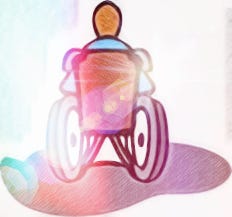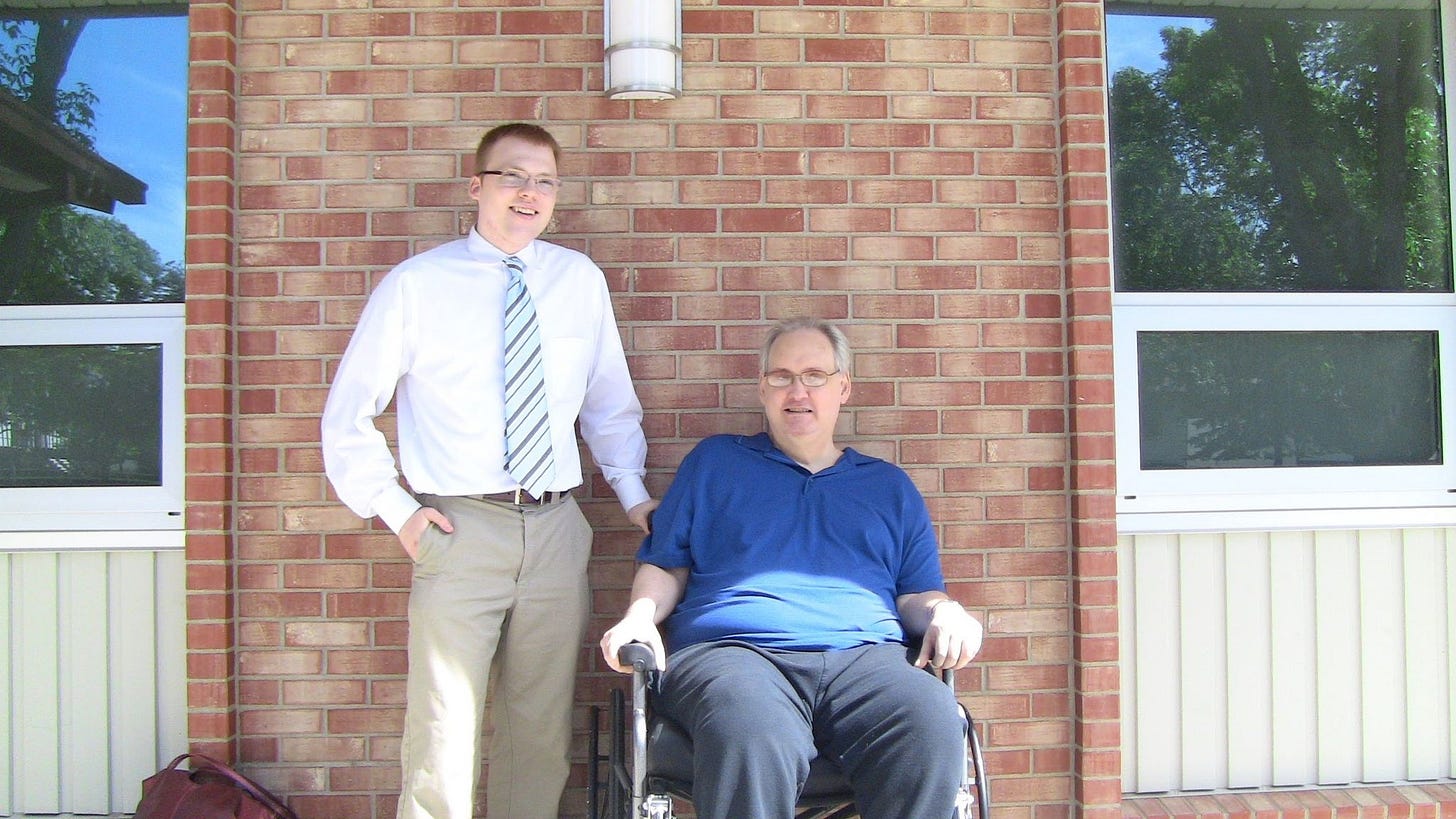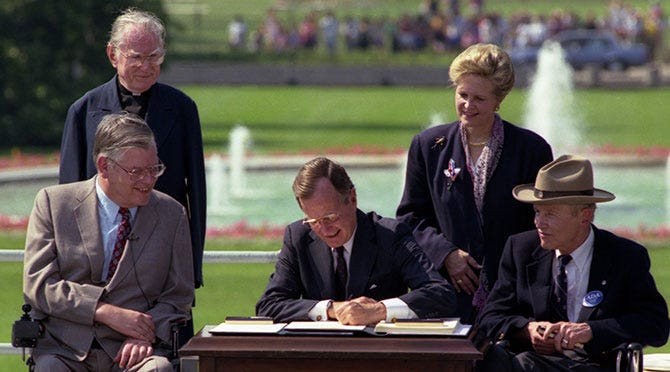A Eulogy for David
As Americans decide on their next path, we should not forget the plight of the disabled.
“Peter, I wanted to let you know that David passed away."
How could this have happened?
Why wasn’t I there for him?
Why didn’t I do more?
After putting down the phone, feelings of confusion and despair flooded my heart. David had been the first disabled friend I made since I myself became disabled some 14 years ago. Always willing to share a kind word. David was the type of disabled man that would make you realize that disability is as much a gift as a curse. Unfortunately, despite our good friendship, I had lost touch over the years as I got busy with school and work.
Frequent Flyer:
I first met David through church.
In my faith, the Church of Jesus Christ of Latter-Day Saints, members are expected to spend time outside of the church, serving others through in-home visits. Growing up, it was the norm for me to go with my parents or Grandfather to spend an afternoon helping a soul in need, whether that meant fixing computers, consoling someone, or leaving a word of prayer.
In 2012, I got my first real chance to go solo and was assigned with my friend Jason a list of members to visit.
Top of that list was David, a 51-year-old 'self-care –meaning a person that requires full-time help to take care of even their most basic needs- a disabled man with a bad back, kidney issues, diabetes, and more. He had recently moved into a nursing home and was known to the nurses at the local hospitals what is called a ‘frequent flyer’ – a cynical term denoting patients that seek frequent but seemingly unnecessary medical care. David was the type of person with an endlessly growing stack of comorbidities but few diagnoses to explain his struggle.
In the United States, around one-fourth of the population deals with some sort of disability; a little less than half of those are over 65. Within this group of under 65 disableds lies a broad range of people from the autistic and the deaf to the blind and developmentally disabled. A majority of the non-elderly disabled -like my own disability based on chronic pancreatitis and associated health issues- can manage their disability without necessitating full-time assistance.
However, according to CDC estimates, there are around 7.5 million Davids throughout the United States. with all-encompassing disabilities requiring full-time care.
Paying for said care is often challenging. Owing to chronic health issues, the disabled are substantially more prone to live under the poverty line, often without any social capital or family to rely upon. Despite the ‘reforms; by the Affordable Care Act, the severely disabled do not easily obtain benefits like Medicare and must rely on state programs, NED vouchers, or Medicaid.
Which is how such a large number of the disabled get shunted off to barely functioning long-time care facilities. This poverty is exacerbated by the insanely low-profit margin care facilities operate under; best described as paper-thin. At the start of the pandemic, anticipating costs incurred by the pandemic, some 65% of nursing homes report being in danger of closure.
Called to Serve:
As long as I knew him, David’s personal situation was always bleak, and it meant he stayed at the hospital often. Jason and I would visit him twice a month and regularly have conversations over the phone. With his deepening health issues, a big focus for working with David was logistics; he struggled with mobility problems and was entirely dependent on his wheelchair.
For the disabled, getting from point A to point B can be a challenge that is not easily solved by simply getting on a bus. Transit services that can accommodate wheelchairs are few and far between. David’s nursing home's transit service did not run during the Winter or on Sundays. So, to get David to church, we would show up at his room an hour before church, and then we would walk him in his wheelchair over the 3-mile journey to the church building and return him the same way following services.
And honestly, it was not always the easiest thing to do.
David had the chronically lousy luck of the severely disabled. The first time we tried to move him, we ended up breaking his wheelchair and puncturing his colostomy bag. One thing after another seemed to go wrong as if someone had put a curse on my friend. But despite the embarrassment that would flummox about every journalistic professional I’ve ever met, David handled it cheerfully and without complaint.
When it came to a situation that might leave the rest of us embarrassed, he always managed it with a laugh and a smile.
This weekly Sabbath ritual would go on for almost six years, and, over time, David became a friend and a regular fixture in our ward. He enjoyed telling everyone he met about his religious beliefs and would share copies of the Book of Mormon with whoever would listen; roommates, nurses, etc.
When we came to help, David would love to tell us stories of traveling to teach English with his mother in Japan. We might discuss his litany of health challenges or hang out and watch sports together. And no matter who you were, or your faith, David always invited you to share a word of prayer.
Admittedly, finding the time to serve David was not always easy. Church back then was a 3-hour ordeal minimum, so adding another 2 hours definitely bit into the day. Yet, Jason and I frequently observed that we found a warm feeling in our hearts and smiles on our faces no matter how long the day had been. Some of my most cherished memories come from hanging out with David.
Adieu:
Unfortunately, as is common in life, time intervened.
This is often the case with the disabled; while situations and options open up for the able-bodied, change may not come so quickly or comfortably for them.
David was not allowed much agency in determining his living situation. Because he didn't have power of attorney for himself, his care was determined by a loving, but distant family to make decisions regarding his care. Since I lost touch, David would be required to move several times, finally settling in a rinky-dink nursing home in a faraway town. One day Jason drove by, and the facility had closed its doors for good. Only last month, with two years and some amateur detective work, did we find him again.
Over the Christmas break, David's health problems became insurmountable, and David told his family and friends that he knew his time on Earth was about up.
And that was that.
David became well-known to many local medical professionals over the years. Hence, a registered nurse friend contacted me to inform me of his passing.
An official cause of his death could not be shared with us, but I suspect COVID-19 played a hand. With the number of health issues David had, Coronavirus would have been that one problem too many. David had been carrying a hole in his soul, he felt the keen pains of loss for a long time after his mom passed away in 2016. She also lived in a care facility, and David devoted what productive energies he had to support her; losing her sapped his strength and willingness to fight on.
During this time of COVID-19, an unknown but anticipated high number of seriously disabled people like him have passed away not just from disease but loneliness. Sickeningly, until recently, the US government never bothered to record disabled COVID-19 deaths. As of this writing, despite many disabled Americans murdered by negligent Governor Andrew Cuomo, it appears very few will receive punishment.
David's fate and this apathy for the disabled are sadly familiar. David leaves behind no children, spouse, career, or possessions. He was given little agency in life, so too in death. His faith, including his religious affiliation, which he held close to his heart, wasn’t reflected in his obituary. In life his agency was limited, so to was his passing.
To me, however, David leaves a powerful legacy. Christ is his role model. He lived as an example of cheerfulness in dark times and a guide to shoulder a lousy hand in life. From working with David, I learned an essential personal lesson; that if I, as a disabled man, wanted something good out of this life, then just surviving will never be enough. To break the hand of fate, I must fill my life with something more, no matter how tough.
Forgotten:
I know I am not alone in feeling that I’ve come short in meeting the needs of a disabled friend and a key member of my community.
Helping the disabled become more is something both sides of the political spectrum should be concerned about. Progressives are interested in helping marginalized groups and solving large systemic problems. On the other hand, classically liberal philosophy understands that the best mode for upper mobility is for private actors, like a church, to invest in individuals.
But as it was with David, the disabled are much less likely to find employment, obtain an education, or have a family network to rely upon. Nor are they equipped to fight bureaucrats to be found “worthy” by the state for welfare support. In my experience, neither American tribe cares enough about the disabled besides their role as mascots to prove their side’s virtuosity.
In many parts of the country, you are as apt as a legitimately disabled person to have your disability recognized by the government as you are to win the Super Ena Lotto Italian lottery (google it). Disability is just as affected by the indifference of our crumbling institutions as any other. Perhaps more so, as their list of options is narrower.
As chronic pain and cancer patients horrifyingly discovered in the last decade, after being abandoned by the medical institutions in favor of a prescription opioid prohibition, no one is left willing to speak up for the disabled.
But not lost:
When George H.W. Bush signed into law on July 26, 1990, the Americans with Disabilities Act, he quoted that famous statement by Jefferson in the Declaration of Independence. He added: "But tragically, for too many Americans, the blessings of liberty have been limited or even denied…This act is powerful in its simplicity. It will ensure that people with disabilities are given the basic guarantees for which they have worked so long and so hard: independence, freedom of choice, control of their lives, the opportunity to blend fully and equally into the rich mosaic of the American mainstream.”
Reflecting on the passing of my old friend brings back positive memories but also bitter regret. Here was a friend, a disabled one, that I allowed myself to get too busy to see and forget. But I rejoice in the knowledge that once I pass through this veil of tears, I will get to meet David again, this time radiant and whole. I pray that when we meet, he can forgive me.
My friends, I beg you do not repeat my mistakes. Please let those Americans like David in. Give them an answer to how you will improve their lives. No shortage of actual reform needs to be addressed. The disabled desperately need that. What's more, they need to share our lives, our hearts, and our homes. For what freedom can they have if we abandon them to the wolves and the cold.




